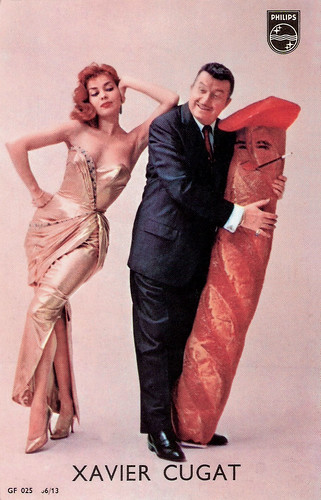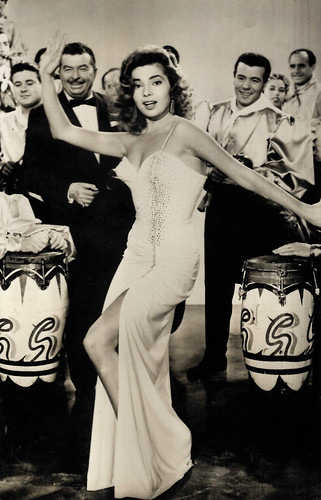
Promotion card by Philips, no. GF 025 66/13.

Dutch postcard. Photo: M.G.M.

Vintage postcard, no. 1151.
The Rumba King at the fashionable Coconut Grove
Xavier Cugat was born Francisco de Asis Javier Cugat Migall de Bru y Deulofeu in 1900 in Girona, Catalonia, Spain. Cugat was born just a few minutes after midnight in the last year of the 19th century. This was considered so remarkable in his home country of Spain that his father, who was a political prisoner at the time, was pardoned and his brothers were exempted from military service. His family moved to Cuba when he was five (or three - sources differ). One of his neighbours was a violin maker who crafted a miniature version of the instrument that would become Cugat's ticket to fame. In Havana, he was trained as a classical violinist and played in cafés. He went on to work at Le Payret cinema, where he provided background music for the silent films shown there. On the recommendation of his violin teacher and after passing an audition, he was hired by the director of the Havana Symphony Orchestra, where he became the first violinist at the age of 12.
In 1915, his family migrated to New York. Like his brother, Francis Cugat (1893-1981), the artist of the famous book cover of 'The Great Gatsby' (1925), he became a graphic designer, more specifically a cartoonist. The Catalan mezzo-soprano Maria Gay introduced the young Xavier to prestigious musicians such as Pau Casals or Enric Granados. Through hard work, Cugat progressed. He met Enrico Caruso, befriended him and accompanied him on his tour of the United States. Caruso got the young man to study with the artistic director of the prestigious Carnegie Hall. Thanks to his contacts in the music world, he could perform at Carnegie Hall, where he met with only moderate success.
At the conservatory, he met Rita Montaner, who studied singing there and they married in 1918 In 1920, the young couple divorced. His family returned to Catalonia, enabling 20-year-old Cugat to study in Germany. In 1924, he returned to the United States. Once again, he appeared at Carnegie Hall. This time the audience gave him a standing ovation, but he still failed to win over the critics. Cugat felt deeply offended. In New York, he met up again with his ex Rita Montaner, and he helped her prepare for Cuban and Antillean music shows. When discovering these shows, he decided to abandon the violin. Montaner founded an orchestra which Cugat directed. In 1926, they were both cast on Broadway in the hit revue 'Una noche en España'.
The following year, he moved to Los Angeles. In California, he worked as a cartoonist for the Los Angeles Times during the day and tried to find members for his band at night. Cugat finally got his break when his combo played at the fashionable Coconut Grove nightclub in Los Angeles and introduced the rumba. Audiences were captivated by the exotic rhythms and sounds of this music that made them shake their hips in an entirely new way. He christened the band 'Xavier Cugat y sus Gigolos' and his style of music caught on. Cugat convinced the owner to hire South American dancers and made the dancers part of his orchestra.
In the late 1920s, the silent film era ended and that of films with sound began. Cugat turned his act into the Vitaphone short A Spanish Ensemble/Xavier Cugat and His Gigolos (1928). In the early 1930s, he appeared with his band in more films such as The Lash (Frank Lloyd, 1930) and In Gay Madrid (Robert Z. Leonard, 1931) starring Ramon Novarro. In 1931, Charles Chaplin asked him to play the violin for one of the musical themes in his film City Lights (Charles Chaplin, 1931). That same year, Cugat hired a 13-year-old dancer, Margarita Carmen Cansino, the future Rita Hayworth, to perform with his band. In 1931 he went with his band to New York for the opening of the Waldorf-Astoria Hotel where he eventually replaced Jack Denny as leader of the resident orchestra.

Belgian postcard. Photo: M.G.M. Jimmy Durante, Peter Lawford, Esther Williams, Cyd Charisse, Ricardo Montalban and Xavier Cugat in On an Island with You (Richard Thorpe, 1948).

French postcard by Editions P.I., Paris, no. 297. Photo: M.G.M., 1950. With Harry James.
The chachacha, the conga, the mambo and the twist
For sixteen years, Xavier Cugat was the orchestra leader at the Waldorf-Astoria Hotel. From 1932 on, the band performed daily evenings at the hotel's Starlight Roof cabaret, and soon afterwards at the hotel's Start Room matinees. Cugat kept the faithful Nilo Menéndez on piano and percussionist Ray Gonzalez, to whom he added Alberto Calderon on drums and José Piñita on trumpet. His niece, Margo, provided the dance numbers, and Carmen Castillo was the band's singer. One of his trademark gestures was to hold a chihuahua while he waved his baton with the other arm. In the 1930s and 1940s, Xavier Cugat was nicknamed 'The Rumba King' because of his popularisation of that Latin dance. He drew heavily on Cuban music but reworked it to suit American tastes. Although his music now bears little relation to its original roots, Cugat made an important contribution to the spread of Cuban rhythms. He shuttled between New York and Los Angeles for hotel and radio appearances interspersed with film appearances.
Cugat used a variety of singers on his recordings, including Alfredito Valdès, Miguelito Valdès, Connie Francis, and Dinah Shore. His 1940 recording of 'Perfidia' with Miguelito Valdés became a big hit. Cugat was instrumental in bringing Latin music to the attention of the US public. He and his band appeared in several memorable MGM musicals in the 1940s. In such films as You Were Never Lovelier (William A. Seiter, 1942) with Rita Hayworth, Bathing Beauty (George Sidney, 1944), and Week-End at the Waldorf (Robert Z. Leonard, 1945), he usually played himself, even if the character had a name other than Xavier Cugat. Cugat followed new trends closely. For example, he made recordings for the chachacha, the conga, the mambo and the twist at the time they were in vogue. A major hit was 'Brazil,' which reached seventeenth place on the Billboard Hot 100 in 1943. Other well-known songs include 'Bahía' by Ary Barroso, 'Siboney', 'Malagueña', 'Andalucía (The Breeze and I)' by Ernesto Lecuona, 'Tequila' and 'El Cumbachero'.
From 1942 to the summer of 1946, the war kept the orchestra away from the recording studios. It placed itself at the disposal of the American Administration for numerous tours of military camps abroad. In 1947, Xavier Cugat left the Waldorf Astoria with two talented singers in tow: Dean Martin and Jerry Lewis. He toured Venezuela the same year, Peru in 1960 and Bolivia in 1962. In addition to his tours, Cugat appeared in a string of films in the late 1940s. As the head of his orchestra, he could be seen in such musicals as A Date with Judy (Richard Thorpe, 1948), On an Island with You (Richard Thorpe, 1948), and Neptune's Daughter (Edward Buzzell, 1949), starring Esther Williams.
He toured the world with his orchestra, to which he added the female voices of Lorrain Allen, Carmen Miranda, Lina Romay and Abbe Lane. He recruited the latter in 1950 and kept her in his band throughout the decade. The first theme she performed with Cugat was 'The Wedding Samba'. Cugat travelled to almost every country in the world. The secret of his success was always knowing how to adapt Latin American music (which he described as "tropical"), simplifying the themes to make them accessible to the tastes of the audiences he hosted. In 1963, Cugat was deeply affected both sentimentally and musically by the departure of Abbe Lane, but he quickly bounced back by taking on a new singer, Charo, whom he made his fifth wife and appointed as a folk singer.
After suffering a stroke in 1971, Xavier Cugat retired. In 1973, however, he recorded one last double LP with his orchestra, which remains one of his best-selling and most famous records. He lived in Catalonia and continued to paint, draw and caricature. In 1990, he was awarded the Cross of St. George by the Generalitat of Catalonia. Cugat was married five times. His first marriage was to Rita Montaner (1918–1920), his second was to his band vocalist Carmen Castillo (1929–1944), his third to actress Lorraine Allen (1947–1952), his fourth to singer Abbe Lane (1952–1964), and his fifth to Spanish guitarist and comic actress Charo (1966–1978). His last marriage was the first to take place at Caesars Palace on the Las Vegas Strip. In 1990, Cugat died of heart failure at age 90 in Barcelona and was buried in his hometown of Girona. Cugat received a star on the Hollywood Walk of Fame at the address 1500 Vine Street. Several songs Xavier Cugat recorded, including 'Perfidia', were used in the Wong Kar-Wai films A Fei jing juen/Days of Being Wild (1991) and 2046 (2004). His song 'Cui Cui' was featured in the animated feature Happy Feet (George Miller, Warren Coleman, Judy Morris, 2006), about a tap-dancing penguin who can't sing a love song.

Belgian postcard by Nieuwe Merksemsche Chocolaterie S.P.R.L., Merksem (Antwerp), no. D 17. Photo: MGM. Betty Garrett and Xavier Cugat are studying the artwork for the book 'Rumba is My Life' by Xavier Cugat, published in 1948.

Spanish postcard by Ediciones J.R.B., no. 85/4. Photo: Ceo. Abbe Lane and Xavier Cugat's Orchestra.
Sources: Xavier Cugat i Mingall, Wikipedia (Dutch, German and English) and IMDb.
No comments:
Post a Comment